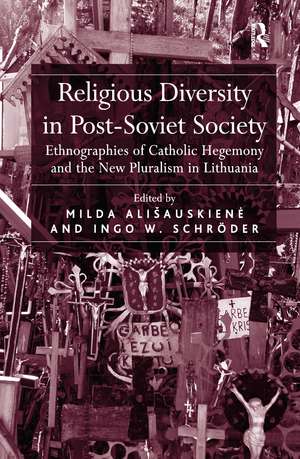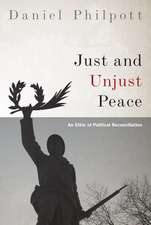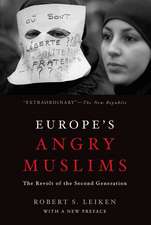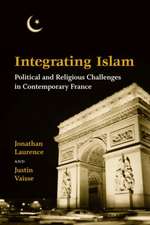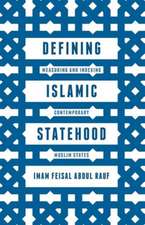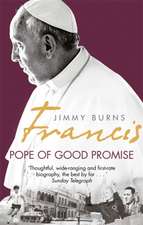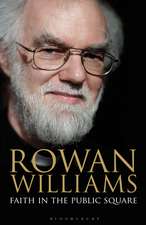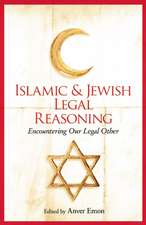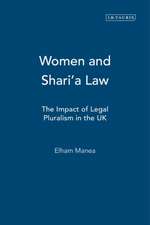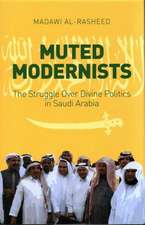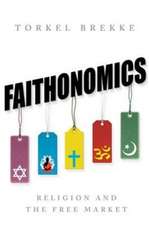Religious Diversity in Post-Soviet Society: Ethnographies of Catholic Hegemony and the New Pluralism in Lithuania
Autor Milda Ališauskiene, Ingo W. Schröderen Limba Engleză Paperback – 22 mai 2017
| Toate formatele și edițiile | Preț | Express |
|---|---|---|
| Paperback (1) | 299.52 lei 6-8 săpt. | |
| Taylor & Francis – 22 mai 2017 | 299.52 lei 6-8 săpt. | |
| Hardback (1) | 822.18 lei 6-8 săpt. | |
| Taylor & Francis – 28 ian 2012 | 822.18 lei 6-8 săpt. |
Preț: 299.52 lei
Preț vechi: 341.55 lei
-12% Nou
Puncte Express: 449
Preț estimativ în valută:
57.33€ • 59.08$ • 48.40£
57.33€ • 59.08$ • 48.40£
Carte tipărită la comandă
Livrare economică 03-17 martie
Preluare comenzi: 021 569.72.76
Specificații
ISBN-13: 9781138111059
ISBN-10: 1138111058
Pagini: 226
Dimensiuni: 156 x 234 mm
Greutate: 0.45 kg
Ediția:1
Editura: Taylor & Francis
Colecția Routledge
Locul publicării:Oxford, United Kingdom
ISBN-10: 1138111058
Pagini: 226
Dimensiuni: 156 x 234 mm
Greutate: 0.45 kg
Ediția:1
Editura: Taylor & Francis
Colecția Routledge
Locul publicării:Oxford, United Kingdom
Notă biografică
Milda Ališauskiene is a Postdoctoral Fellow at the Centre for Oriental Studies at Vilnius University and a Lecturer in Sociology at Vytautas Magnus University, Kaunas, where she teaches courses on religion and society, contemporary processes of religious group formation and religion and politics. Her 2009 dissertation was entitled "Manifestation and Peculiarities of New Religions in Lithuania: the Case of the Art of Living Foundation". She has published several articles on contemporary religiosity in Lithuania, focusing on New Age, the Art of Living Foundation, and Satanism, which are based on the material collected during her fieldwork. Her research interests include secularization, religious pluralism, religious fundamentalism, new religious movements, New Age and Neo-Hinduism. Ingo W. Schröder is a Senior Researcher at the Social Anthropology Centre, Vytautas Magnus University, Kaunas, and an Adjunct Professor (Privatdozent) of Social Anthropology at Philipps University, Marburg. He was a Senior Research Fellow from 2007-10 at the Max Planck Institute for Social Anthropology in Halle/Saale in the research project "The Catholic Church and Religious Pluralism in Lithuania and Poland". His main geographical fields of expertise are Eastern Europe and Native North America, and his research has focused on Catholicism, Neopaganism, socialism and postsocialism, the politics of identity, heritage and culture, as well as urban anthropology. His most recent publication is the edited volume (with Asta Vonderau) Changing Economies and Changing Identities in Postsocialist Eastern Europe (2008). In 2008/2009 he spent a year of fieldwork on urban religiosity in Lithuania.
Recenzii
'Lithuania is normally, and correctly, thought of as a majority Catholic country, but this volume reveals the hitherto unacknowledged richness of its religious landscape. The Catholic Church is having to come to terms not only with its Soviet past but also with the contemporary scene in which it has to co-exist with Lithuania's minority traditional religions (Greek Catholics; Russian Orthodox; Old Believers; Judaism; Karaism; Islam; Lutheran and Reformed Churches) but also with new (to Lithuania) religions including Baptists; Buddhists, ISKCON; Unificationists; New Agers, Pagans and, perhaps most challenging of all, the Word of Life and Jehovah's Witnesses. This interesting, informative and invaluable volume not only charts the religious scene in this small Baltic country, but also provides a template with which we can compare the situation in which other Central and Eastern European countries find themselves two decades after the collapse of atheistic socialism. It is a book that should be on the shelves of all those with an interest in religion, social change and, particularly, but by no means only, the New Europe.' Eileen Barker, Professor Emeritus, London School of Economics, UK 'Poised between the low levels of religiosity which characterise its Baltic, ex-Soviet neighbours and the high levels of Catholic Poland, Lithuania provides a fascinating window through which to examine processes of religious reconfiguration after socialism. The "birthright" Roman Catholic Church exercises a diffuse hegemony, especially in rural areas, but the contributors document an astonishing variety of beliefs and practices. This volume will be read with pleasure and profit by all concerned with the complex interdependence of the religious and the secular in modern Europe.' Chris Hann, Max Planck Institute for Social Anthropology, Germany '... an in-depth look at the relation of the once-predominant Roman Catholicism in Lithuania to the new pluralism that has emerged in the small
Cuprins
Introduction, Milda Ališauskien?, Ingo W. Schröder; Chapter 1 Catholic Majority Societies and Religious Hegemony: Concepts and Comparisons, Ingo W. Schröder; Chapter 2 The History of Religion in Lithuania since the Nineteenth Century, Ar?nas Streikus; Chapter 3 “We Are All in Exile Here”: Perceptions of Death, the Soul, and the Afterlife in Rural Lithuania, Lina Pranaityt? Wergin; Chapter 4 The Elusive Religious Field in Lithuania, Ingo W. Schröder; Chapter 5 From Confrontation to Conciliation: On Syncretic Rapprochement between Catholics and Charismatic Evangelists in Lithuania, Gediminas Lankauskas; Chapter 6 Romuva Looks East: Indian Inspiration in Lithuanian Paganism, Michael F. Strmiska; Chapter 7 The New Age Milieu in Lithuania: Popular Catholicism or Religious Alternative?, Milda Ališauskien?; Chapter 8 Muslims in Catholic Lithuania: Divergent Strategies in Dealing with the Marginality Status, Egd?nas Ra?ius; Chapter 9 The Neo-Buddhist White Lotus Movement in Search for Legitimacy, Donatas Glodenis; conclusion Concluding Thoughts, Ingo W. Schröder;
Descriere
Since the end of state repression against religion, two major processes have taken place in the formerly socialist countries: historically dominant churches strive to reassert their position in society, while new religious groups and ideas from various parts of the world are proliferating. Religious Diversity in Post-Soviet Society presents the first collection of ethnographies of this new religious diversity for Lithuania. The authors reveal how Catholicism has become increasingly diversified and other religions (Charismatic Protestantism, Baltic Paganism, Eastern religions and other alternative spiritualities) are claiming their space in the religious field.
